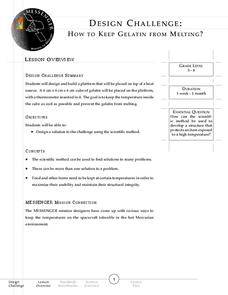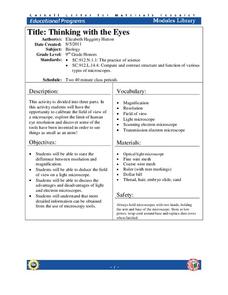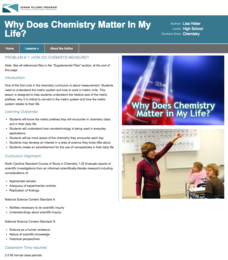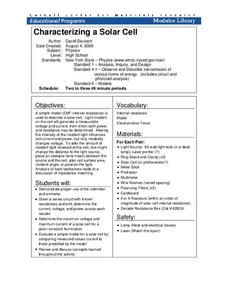Messenger Education
Design Challenge: How to Keep Gelatin from Melting
The inside of the spacecraft Messenger, which explores Mercury, will experience temperatures from 32 to 91 degrees Fahrenheit. In the final installment of a series of four space-related activities, groups spend time discussing and...
Beyond Benign
Puzzler
Are some packaging materials superior to others? Using sustainability as a guide, scholars analyze different packing materials to describe their life cycles. They create puzzles to communicate their findings.
Cornell University
Polymerization
Explore condensation polymerization and additive polymerization through hands-on activities. Young scholars first model additive polymerization with paperclips. They finish the activity by using condensation polymerization to create a...
Cornell University
Thinking with the Eyes
Objects are larger (or smaller) than they appear! Scholars use a laboratory investigation to explore the difference between resolution and magnification. The activity allows them to calculate the size of the field of view of their light...
Kenan Fellows
How Do Chemists Measure?
Young chemists create gold nanoparticles as they learn to measure accurately with the metric system. They create an advertisement for the application of nanotechnology to complete the first lesson in a series of six.
Indiana Department of Education
Amusement of the Future
Take your class on the ride of their lives! Physical science scholars get an in-depth look at potential and kinetic energies in an amusement park-themed unit. Students research, design, and promote their own amusement parks,...
Curated OER
Navajo Pottery
In this Navajo pottery worksheet, students conduct an experiment using various samples of earthen material. Students are required to collect at least three samples of dirt. Students can make observations about the texture of the sample...
Fluence Learning
Writing About Informational Text: Music and the Brain
Even if you've never picked up a musical instrument, chances are that music has directly impacted your mental and emotional development. Sixth graders engage in a reading activity in which they read two articles on the impact of music on...
Curated OER
Identification of Wildfire/Structure Interfaces, Risk Assessment of Structures, and Risk Management
Students participate in a class discussion about wildfire and urban interfaces as well as risk of wildfire in the area in which they live. After reviewing a wildfire/urban interface fire safety checklist, a walking field trip is...
University of Wisconsin
Getting the Word Out
An appropriate way to celebrate and conclude the construction of a rain garden is to share it with the community. Small groups collaborate to design an outreach product such as a PowerPoint presentation, brochure, or poster, to draw...
Curated OER
Nuclear Chemistry Project
Radiation has numerous real-world applications, some of which are relatively safe while others can be extremely hazardous. In this nuclear chemistry project, young scientists choose a practical use of nuclear reactions to...
Beyond Benign
pH Neutral
Acids and bases combine to create our most popular shampoos—who knew?! Using the eighth lesson in a 24-part series, your classes study how acids and bases combine to create safe mixtures such as those in your scholars' shampoos. They...
Cornell University
Characterizing a Solar Cell
Young classes are sure to get a charge out of this lesson! Learners experiment with circuits of a solar cell. They practice determining current, voltage, and power for the circuit and maximize the voltage and current of the cell.
Pace University
Grades 9-10 Energy Sources
Alternative energy sources are becoming increasingly important. Learners have the opportunity to explore alternative energy sources using a differentiated instruction unit. They group together based on ability levels, assign roles to...
Curated OER
String Telephones and Musical Straws
Fourth graders investigate pitches of sound. In this physical science lesson, 4th graders participate in two activities that help them explore pitch--one activity has them working with string telephones and the amount of tension...
Curated OER
What Temperature Is It?
Students answer the question, What is temperature? In this temperature lesson, students use hot chocolate and ice cubes to measure temperature with a thermometer (Fahrenheit and Celsius). This lesson includes a student activity...
Curated OER
Levers
Fifth graders participate in a review discussion of the parts of a lever, resistance or load, fulcrum, and effort. Next, they complete activities at six experiment stations while collecting data that they share with the class. While...
Curated OER
Strange New Planet
Students simulate different spacecraft missions using materials provided. For this space science lesson, students observe and record a planetary model's features from a distance. They relate this activity to scientists' space exploration...
Curated OER
Bread Cells
Fifth graders examine plant and animal cells. In this plant and animal cell lesson, 5th graders define what cells are, label their parts, and describe how plant and animal cells are different. They observe cells at a number of web sites,...
Curated OER
Insulators and Conductors
Fourth graders experiment to discover which items are conductors and which items are insulators. In this insulators and conductors lesson, 4th graders experiment and create a T-Chart. Students are assessed on the correctness...
Curated OER
An Introduction to Light Unit-Third Grade
Third graders are introduced to light in an eight part unit which includes activities, additional resources, and rubrics for each part. Students address topics such as energy, reflection, absorption, and refraction through hands-on...
Curated OER
What's the Matter? (Grade 3)
Third graders organize information about the three types of matter and to reinforce concepts learned in the matter unit of the science curriculum. They use Inspiration software to create a concept map of the three types of matter.
Curated OER
Concrete Research
Students explore concrete. In this physical science and computer research lesson, students work in groups to answer specific questions about concrete. Each group of students completes a different worksheet with a specific subtopic....
Curated OER
Science Inquiry Lesson: Mapping Project
Learners explore the methods of creating maps. They create a map of Animas River Park using a compass and measuring tape, develop a single map from the team map sections, and devise another map of the Animas River Park using a GPS unit.

























